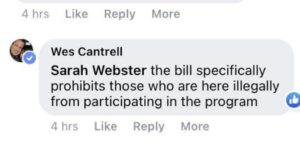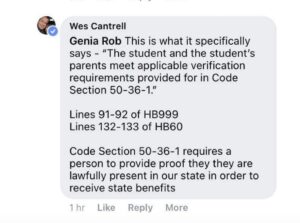
K-12 “school choice” for illegal aliens is a bad idea
“School choice” is a good idea. But illegal aliens should be excluded from taxpayer-funded private school tuition benefits.
You can become familiar with the issue here.
Below are a few nuggets from Rep Wes Cantrell and a bit of simple legal reality. We will now sit back and watch the Gold Dome Dog and Pony Show on”school choice” in a state with more illegal aliens than Arizona. 
_
We are told that Rep Cantrell’s bill (s) “specifically prohibits those who are here illegally from participating in the (scholarship) program.” Where? What line number?

We assume Rep Cantrell means the “Promise Scholarship” proposed in HB 60 and HB 999. We see no language like that in either bill. There should be. All Cantrell has done is refer to a verification system in a state law, OCGA 50-36-1, which is unworkable for this purpose.
FACT: OCGA 50-36-1 does not require anyone to produce documents that prove lawful presence.
Rep Wes Cantrell is telling constituents and presumably other Republican legislators (it’s apparently still a secret to the Democrats, as he hid it in his committee presentation on HB 60 that saw zero public comments) that OCGA 50-36-1 (“the verification law”) “requires a person to provide proof they are lawfully present in our state in order to receive public benefits.”

It doesn’t.
The term “lawfully present” which, as noted by the 11th Circuit Court of Appeals, is not defined anywhere in the INA, refers to presence in the United States, not Georgia.
Presumably, Cantrell is referring to the section of the verification law that requires the applicant for public benefits to provide at least one “secure and verifiable document” as defined in OCGA 50-36-2. That affidavit can be seen here from the Georgia AG office website. It is clear that the secure and verifiable documents “may not be indicative of residency or immigration status.” Cantrell is wrong.
It should be noted that the intent of the legislation that created this part of the law was to require applicants to produce documents that provide proof of immigration status or U.S. citizenship.
FACT: OCGA 50-36-1 will not serve to verify eligibility of K-12 students for a state private school scholarship
The verification law was written to verify eligibility of adults or individuals near the age of eighteen. “…if the applicant is younger than 18 years of age at the time of the application, he or she shall execute the affidavit required by this subparagraph within 30 days after his or her eighteenth birthday.”
Neither the application nor the affidavit would have any effect in holding a 4th grader (for example) responsible for the accuracy of the information entered or the documents submitted. Unless the state somehow decides to prosecute a kid for false swearing.
There is no provision for anyone except the applicant for (and recipient of) the public benefit to complete the application or the affidavit. Repeat: There is no provision for parents to complete or sign anything. While I cannot find it now, I have seen Cantrell tell at least one person on a Facebook exchange that “the parents would sign the application for the student…” or words to that effect.
- Related: Rep Wes Cantrell’s latest “fix” for HB 999 & HB 60… isn’t
Cantrell’s unworkable verification solution could pave the way for massive fraud
The law says that mere completion of the application will serve as “presumed proof of lawful presence” until the information submitted attesting to eligibility is verified by the SAVE program. USCIS would not likely consider a query based on a second party signature on an application or an affidavit. Which means the SAVE program would not be completed. It is very probable that if Cantrell’s legislation were to become law as it is as I write on Feb 8, 2022 that the “verification system” Cantrell has set up would go no further than a K-12 student (or parent/guardian/custodian) signing off on an application completed by a parent/guardian/custodian and be filed away as a finished product because the SAVE program was never run.
State officials should carefully consider the obvious shortcuts, falsehoods and omissions involved in Cantrell’s plan
Is the “Promise Scholarship” a clear “public benefit” for USCIS?
Curious readers (not many of those in the House Education committee) will need to know the people at USCIS who run the SAVE program must have clear authorization and citation of a statute to verify the eligibility of the applicant for a specific public benefit. OCGA 50-36-1 lays out a list of public benefits that includes “grants” and “state grant or loan.” While the proposed “Promise Scholarship” in HB 60 and HB 999 may in fact fit into one of those two categories for the state purposes, it is not at all clear that it is specific enough for the USCIS staff to operate the SAVE reporting. In early February 2022 I spoke at length with a senior USCIS staffer in the Trump administraton several times on this topic.
As is stated above, under state law, if there is no SAVE check, the affidavit is regarded proof enough for the “verification.”
All of the above is predicated on the presumption that the Plyler v Doe SCOTUS decision and the far left would allow the state of Georgia to ask K-12 students and/or their parents about immigration status. Alabama tried that and was rebuffed. There is a much simpler way to do this.
We don’t see anyone taking the time to create a workable bill. What will happen if this train wreck were to make it to Gov Kemp’s desk and he had to veto it as unworkable (as if) after the Republican base was all “school choice!” juiced?

